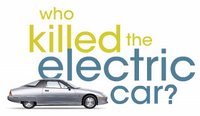MOVIE: Who Killed the Electric Car?
 Q: What DID Tom Hanks, Mel Gibson, Peter Horton, and Ted Danson have in common?
Q: What DID Tom Hanks, Mel Gibson, Peter Horton, and Ted Danson have in common?
A: They all leased electric cars.
"Leased" not "owned." Past tense... past history. Hint for consumers: next time a car manufacturer refuses to sell you their products, they don't really want ANYONE to keep it.
General Motors EV1 - R.I.P. - b. 1996, d. 2004
There is something eerie about a hunk of metal, rubber, autofluff, and plastic not merely rusting away in someone's front yard or garage, but being scooped out of the hands of its driver and crushed out of existence. Why the finality? Did each car represent some kind of threat - like the futuristic chip in the "Terminator" series? Or a dangerous memory from "Total Recall"?
That's the implication of a new feature length film to be released June 28th titled "Who Killed the Electric Car?" This movie could have been made for public television's exposé "Frontline" series, but the producers and Sony Picture Classics decided to distribute it to theaters like an increasing number of advocacy "edu-tainment" - or "docu-ganda" as The Christian Science Monitor's Dan Wood likes to call them - i.e., Michael Moore's Fahrenheit 9/11" and Al Gore's recent "An Inconvenient Truth".
The intention is to generate outrage and activism - stimulate heat by shining an unforgiving interrogator's light and implying the worst. Build a website, enlist volunteers, make a statement with a grass roots organization - to create a campaign to sell the mov...eh...message and make sure it doesn't happen again.
This film presents a cradle to grave history of a marvelous machine that was too good for Detroit to allow to spawn imitators. It was born out of an idealistic California environmental mandate, killed by the successful appeal by an auto industry frantic to overturn the mandate, and summarily executed by the manufacturer.
Now the domestic manufacturers and their shareholders are paying for this shortsightedness - big time. They have unwittingly ceded the crest of the electric car wave to Japanese-bred hybrids. It's a replay of Detroit's worst nightmare - the oil crisis of the early '70s - that gave Japan and Germany a significant beachhead on the once impregnable American auto industry. How ironic. How deserving.
The auto industry needs a sparkplug. Maybe, having just planted Pixar within the Disney firmament with the success of "Cars", Steve Jobs could be hired to envision the next big thing - "insanely great" automobiles that become the "killer app" that stokes the global paradigm shift to renewable energy.
Maybe the manufacturers would actually sell them this time.
technorati greenhouse, ghg, movie, EV1, legislation, General Motors, hybrids, electricity


3 comments:
Speaking of electric cars -I thought your readers would be interested in our free green tech virtual stock contest www.greentechinvestor.com The contest starts you off with $200,000 in virtual money, you trade from our list of 'green' stocks and you can win a ZAP electric car or electric scooter.
Thanks
Ann-Marie Fleming
You can't complain about AN INCONVENIENT TRUTH getting TOO much attention -- it needs as much as it can get -- but is *has* overwhelmed other great films like this one. Thanks for the reminder! (And I've mentioned your blog over on my own, www.thisnext.com/blog)...
There is a danger from the perception of "stickittotheman-itis" in these films - the temptation to complain about some imagined conspiracy from a sinister, centralized power base. I think it is counter-productive to think in these terms.
It is true that some existing profiters from the oil energy paradigm may be jealously protecting their turf - but historically this kind of behavior is self-defeating. Failure to adjust to the flow of new resources, technologies, political realities, and demand ends up hurting the longterm profitability of those who fight change.
Conversely, a command economy that tries to control development in whatever the perceived solution-of-the-month may be is also to be avoided because it is wasteful and heinously counter-productive.
I think the key is gradual change and a proliferation of technology development initiatives. I call this "fractal growth." Let "survival of the fittest" show us what works and what doesn't while providing us with performance feedback of what consumers demand.
Legislators who prey off of constituent fears with simplistic solutions to the incredibly complex dynamics of supply and demand do us all a great disservice. They should facilitate development rather than try to micromanage it. They should also insure that the playing field is level.
I think "... Electric Car" demonstrates how politically difficult this process can be and what the consequences are for manufacturers and consumers alike.
Post a Comment